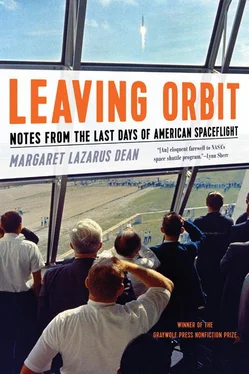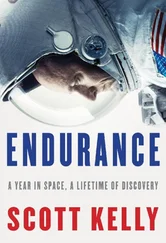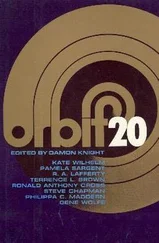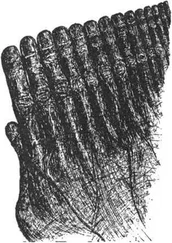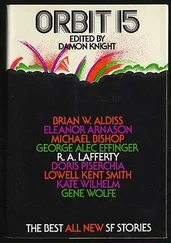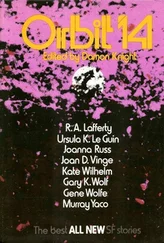“Here she comes,” Omar says. As Discovery creeps closer, we can see that it is accompanied by astronauts wearing their bright blue flight suits. I recognize a few, including Eileen Collins, the first woman to serve as a space shuttle commander. As they walk, one of the astronauts pats the landing gear door affectionately, the way you’d pat a horse. I feel Omar flinch almost imperceptibly next to me. The imperative to keep people from touching Discovery ’s tiles will never leave him.
As promised, Discovery is pulled nose to nose with Enterprise , and the crowd applauds this sight.
* * *
Speeches ensue: One from the director of the Air and Space Museum, who gets choked up and has to take a moment to compose himself. Then the NASA administrator, Charlie Bolden, who starts out by recognizing the spaceworkers who have made the trip today, the people who worked on Discovery with their own hands. This earns a huge round of applause.
The rest of Bolden’s speech emphasizes that the next steps are under way: NASA is partnering with private companies to get astronauts and cargo back and forth from the International Space Station, and NASA will now focus on long-range spaceflight. The same story we’ve been hearing all along, yet the Space Launch System is still underfunded and unpopular with many spaceflight advocates. In a best-case scenario, SLS won’t get astronauts back into space before 2021, and won’t get us any farther than we’ve already been until 2025 or later. This is tough to get excited about, especially when so many in Congress are eager to make a name for themselves by killing this relatively unambitious plan altogether.
John Glenn is introduced by the secretary of the Smithsonian Institution, Wayne Clough, who uses the same F. Scott Fitzgerald quote to introduce him that I used to introduce Buzz Aldrin two years ago: “There are no second acts in American lives.” I am seized with horror that this quote I thought was so clever is actually incredibly obvious, that maybe Buzz listened to me reading it so confidently in my introduction of him and rolled his eyes, having heard it a million times before. “Now Discovery begins its own second act as an engine of imagination, education, and inspiration,” Clough finishes.
John Glenn takes the podium. He is ninety years old. Like all of us, he has been sitting out here for over an hour in the beating sun. Some people a fraction of his age are looking worse for wear, but he stands straight as a stick and looks out at us with bright eyes. I think of Oriana Fallaci’s fantastic description of him when he was in his forties: he reminded her of the GIs who showed up to liberate Italy and gave her chocolate when she was a child. “[A] whirlwind of freckles and strong white teeth… a pair of sparkling green eyes, whether shrewd or innocent I couldn’t tell.” The description is still oddly fitting despite the passage of forty-five years. Same freckles, same sparkling green eyes. John Glenn begins.
“Perhaps it started with the pioneers who first lived in this new land, but Americans have always had a curious, questing nature that has served us well.” He is a born public speaker; we are in the palm of his hand.
John Glenn points out that the wagon trains that took settlers west in the nineteenth century considered ten miles to be a good day’s trip. Discovery , the spacecraft upon which he became the oldest astronaut in history at age seventy-seven, could cover the same distance in less than two seconds. He reminds us that only twenty-three years after railroads replaced the wagon trains, the Wright brothers flew their first plane at Kitty Hawk. Only fifty-nine years after that, John Glenn became the first American to orbit Earth. Seven years later, Neil and Buzz walked on the moon. Some of us do math in our heads, dismayed. How long will it be until we can add another leap?
John Glenn gives a rundown of the accomplishments of Discovery. Then he hits a part of the speech that gets everyone’s attention.
The unfortunate decision made eight-and-a-half years ago to terminate the shuttle fleet, in my view, prematurely grounded Discovery and delayed our research. But those decisions have been made, and we recovered and now we move on with new programs and possibilities unlimited.
It’s one sentence of criticism, immediately followed by a hedge. The line gets applause, but it’s not entirely clear whether the crowd is clapping for the criticism, for the “new programs and possibilities” line, or because he has paused. Omar raises his eyebrows in surprise and we exchange a look. No one at any of these events has ever said anything even vaguely negative about the decision to retire the space shuttle—the closest you’ll hear is the word bittersweet. But here John Glenn himself has criticized the retirement directly. I feel oddly elated.
He closes with this:
We recently celebrated a 50th anniversary of our first orbital flight. In a speech to Congress following that flight, I closed with a statement that I would repeat today. “As our knowledge of the universe in which we live increases, may God grant us the wisdom and guidance to use it wisely.” Thank you.
A document officially transferring ownership of Discovery from NASA to the Smithsonian is produced. It’s signed with great flourishes, John Glenn serving as witness.
For nearly as long as I’ve been reading about spaceflight, I have had strong and conflicting emotions about John Glenn. He is, on the one hand, the most charismatic Mercury astronaut, the appealingly boyish bow-tied moralist who earned the ire of the others by suggesting that they not cheat on their wives. At the same time, he is the man who testified at the 1962 hearing on the possibility of letting women into the astronaut corps that it is “a fact of our social order” that women don’t belong in space, who found it so hard to grasp the simple fact that the women in the same room with him harbored the same dream he did. I don’t know whether John Glenn regrets saying what he did in 1962, or whether he no longer believes it to be true. But I do know that in 1998 he chose to climb into space shuttle Discovery with a woman, Chiaki Mukai, among his crewmates, thereby trusting his life to her competence. There are no reports of his having had any qualms about doing so.
The director of the Smithsonian formally introduces Discovery as the newest holding in the museum’s collection, and though everyone claps, I’m surprised by how awful that sounds to me. I knew I was coming here to see Discovery put into a museum, yet it still catches me off guard, the finality of the sentence. Discovery , which has flown into space thirty-nine times, which I personally watched tear into the sky on two different occasions ten years apart, which Omar has dedicated his adult life to keeping safe, is now officially a museum piece.
* * *
For most of the afternoon, the two orbiters stand nose to nose while people converge and disperse, taking each other’s pictures. Omar stands out on the field for a few minutes, shading his eyes, looking at Discovery and Enterprise. I watch him, trying to put myself in his place. Omar has been around space shuttles since before he can remember. Discovery specifically he has spent many hundreds of hours with—he has seen it standing on the launchpad readied for flight and parked in the Orbitor Processing Facility for repairs and rolling horizontally to the Vehicle Assembly Building and rolling vertically on the crawler out to the launchpad. He has seen Discovery slung up on its harness dangling from a crane affixed to the ceiling of the VAB, being joined to its external tank and solid rocket boosters. He has seen it steaming on the runway fresh from its return to space. Omar has crawled inside the crew compartment, sat in the commander’s seat, and felt how his weight settled in that position from which astronauts have waited so many hours to launch. He has traveled to California, twice, to help out when Discovery was forced to land at Edwards Air Force Base and overseen it being mated to the shuttle carrier aircraft. He has seen Discovery on rainy days and on sunny ones, when there have been threats of hurricanes and while its engines were removed after its last flight, when it was being prepared for the end of its life. The engineers who created Discovery and kept it working have not spent nearly as many hours in the personal company of Discovery as Omar has. Certainly not the astronauts themselves, who live in Houston and train in simulators, visiting the actual orbiters only briefly before flying in them.
Читать дальше
